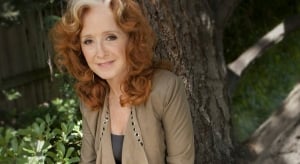
NEW YORK — Life on the road had taken its toll and over the years Bonnie Raitt let herself go, ballooning to unhealthy size and looking at the world through too many empty shot glasses. “Even to me,” she says with a grimace, “I didn’t look healthy.” So she went into therapy, joined Alcoholics Anonymous and lost a lot of weight. Tomorrow night and Thursday, a lean, clean Raitt plays Wolf Trap with a new hit record behind her, finally looking and feeling as terrific as she’s always sounded.

And it all happened because of Prince. Sort of. The diminutive funkster called Raitt in 1987 after she’d gone through a long series of hassles with her record company. A longtime fan, Prince had a new record label, Paisley Park, and, emphasizing his history of working with women in rock, wanted Raitt to sign on.
She said yes, but it turned out to be more premise than promise; the partnership was delayed when Raitt injured her hand skiing and was sidelined for two months. By the time it healed, Prince was embroiled in his “Sign o’ the Times” film and extending his European tour. Worse, he had asked Raitt to cancel her lucrative summer tour, which she did (and “that’s how I make my living,” she notes), but ended up working with her only three days before attending to his own career problems.
It was a long summer. “We never really got a chance to work together, and then he never called,” Raitt says. “That kind of help I don’t necessarily need. I enjoyed those few days together, but frankly I needed to get on with my career.”
But the brief encounter started Raitt on the road to recovery. She had finally reached the breaking point. “Frankly the idea of doing a video with a guy that teeny when I looked like a tank was not really thrilling to me on a self-esteem level,” she says. “So I was scared, shocked into it, like some people getting married and wanting to fit into their wedding dress. Sure, it’s a vanity thing, but self-esteem is the name of the game.”

Raitt knew that “an entire country of fans was going to love me even if I was brokenhearted and emotionally and physically not in the best shape, because I was still singing and playing great.
But this was not something I wanted to keep feeling or looking like. Live, I could look like whatever I wanted, but one of the things about the modern age is you have to make videos, and frankly I knew no one was going to want to look at me.”
Her stint with AA began shortly thereafter. By the time the Prince deal officially fell through, “I was already six months sober.” “I called out to the Greater Being that I needed a break to get off the road,” Raitt recalls. “The skiing accident was just debilitating enough with my thumb in a cast so I couldn’t play guitar for a couple of months.
So here it was: I didn’t have an excuse anymore. A situation was created for me; I asked and it was responded to. People reach a point where they look in the mirror and say I’ve had enough. And let’s face it, I was a latecomer in my circle to cleaning up.”
Raitt had only to look at the surviving members of another Washington cult favorite, Little Feat. Its founder, Lowell George, had been a great friend and soulmate; an obese George had died of a heroin overdose in Washington in 1979. Since 1982, Raitt has been dedicating Eric Kaz’s “River of Tears” to George in her concerts. “I’ve done it every night since we recorded it,” she notes quietly, “but now I have six or seven other people who have died since that I include — Richard Manuel top-most, because he sang it with me on my record … Roy Buchanan … Jesse Ed Davis … Paul Butterfield … John Cippolina.
I mention their names as a way of appreciating why I’m standing there in front of those people who’d love to be seeing all of them up there with me. …”
Home on the Road Bonnie Raitt’s luxuriantly cascading red hair has long been a mane event, but much of her two-decade-long career has been spent on rock’s sidelines. Nonetheless, Raitt, 39, has developed a deeply loyal following that kept her in full houses on the road even without hit records. Washington in particular has been a stronghold since Raitt opened for John Prine at the Cellar Door in 1969: Tomorrow night’s show, with opener Lyle Lovett, sold out quickly, and an added Thursday concert is closing in on the same.
While Raitt’s repertoire suggests that she’s not always been lucky in love, this particular long-term affair with her listeners has been wonderfully requited. “Every year, with or without a record,” Raitt said warmly of that support, as she prepared to play New York’s Ritz a few days ago. “It’s been a lifesaving thing for me, financially and emotionally. Even when my personal esteem, my love life and my record company career were faltering, the one thing that kept me going was my relationship with the people who like and appreciate the music I do.
“Of course I like to party — that’s why I do this for a living, so I can hang out with cute guys, have a good time and stay up late — but I never did anything that would jeopardize my singing or playing, or my ability to continue my career. Maybe that shows my devotion to how much I want to do this.”
And it may explain why Raitt’s shows continue to sell out. That and the fact that she has long been a champion of great American music, master of the bluesy ballad, the insinuating R&B groove, the invigorating rocker and the revealing folk tune. Her taste in songwriters has been well served by a husky, luminous voice, and her immaculate slide guitar work has made her one of the first authentic women instrumentalists in rock.
Raitt has been a role model and inspiration to countless artists and fans, regardless of gender. She’s also maintained a remarkable consistency of liberal activism, reflecting the social and political conscience first developed when she attended Quaker summer camps during the late ’50s and early ’60s.
Now, after 17 years and nine albums with Warner Bros., which signed her up the year she quit Radcliffe for the road, Raitt has linked up with Capitol/EMI and with a new producer. Returning to the more intimate, focused style of her early records, she has come up with her first hit album, currently No. 22 on the charts. Prophetically, it’s called “Nick of Time,” though Raitt has not shed the caution bred by bitter experience. “I’m wiser and bemused,” she says. “I look at the music business, and always have, with a great deal of cynicism.”
And with second-generation insight thanks to the long, but low-key, high-integrity career of her father, Broadway veteran John Raitt, who starred in the original productions of “Carousel” and “The Pajama Game.” “I watched my dad get bounced around, and he was a great talent with a lot of integrity who didn’t want to sell out and play Las Vegas lounges,”
Raitt says in words that could as easily apply to herself. “And because he wasn’t a hip guy, he wasn’t on the ‘Tonight’ show and therefore he didn’t get more bookings. He did what he felt like doing and didn’t do what he didn’t feel like doing, and consequently he wasn’t as big a star as he could have been.”
The experience, Raitt adds, extended to blues artists and songwriters whose tunes she championed and then watched as they tried in vain to get record deals or were dropped by labels time after time. “I watched a lot of my friends get kicked around, people more deserving than me, more talented,” she says. “I sometimes felt I was over-appreciated.
On the one hand, I felt I deserved to get wider acceptance; on the other hand, compared to the people I idolized, I was getting overly lauded.” All that said, Bonnie Raitt might as well have been Willie Nelson’s redheaded stranger as far as commercial radio was concerned. Although she was a staple of progressive FM in the ’70s, she all but disappeared in the ’80s, her career surviving on the strength of her live shows.
Now, with the success of the new album, Raitt is back on the airwaves. “Love Letter,” the third single from “Nick of Time,” is set for release even as MTV and VH-1 continue to rotate the playful, sensual video for Raitt’s cover of John Hiatt’s “Thing Called Love,” in which pal Dennis Quaid is the object of her affection. “Dennis plays my love interest, which I’m sure is one of the reasons it got so much exposure,” Raitt says with a chuckle. “Also, everybody loves John Hiatt, it’s a good version of the song, and in my estimation, it’s a lot more sexy than the ones where people run around in their underwear. Dennis and I also share the same band members {Quaid will be recording soon}, so I asked him to do it. I wanted to have someone cute to sing to.”
Well, considering the man troubles Raitt has chronicled on her albums over the years — love usually left her feeling blue or seeing red — having Dennis Quaid as her video beau sounds like a dream come true. Raitt laughs. “He’s not my generation and he’s got a nice girlfriend, too. We’re buddies.”
Even with that level of success, “I’m pretty realistic,” she says. “I’ve heard ‘this record’s going to be the one’ ten times now. Frankly, I don’t care if it’s ‘the one’ or not, because I want the next one to be able to continue to make me a living. I don’t want to be this year’s model, because next year the inevitable comparison will be, ‘Well, she had that one shining moment when she wrote ‘Nick of Time.’ … I guess that recovery rap she did was good for one year… .’ “I guess I have a sardonic, wizened outlook.” ‘Nick of Time’ As brilliant as “Nick of Time” is, it’s not the follow-up album people were expecting when Raitt finally left Warner Bros. in 1987.
As far as Raitt was concerned, Warners had left her years before, first in 1979, when the label initially dropped her, Van Morrison and Arlo Guthrie, among others, and finally when they failed to support several subsequent releases after they re-signed her about a year later. The label refused to release a 1983 album she called “Tongue and Groove,” and when parts of it were redone for “Nine Lives” three years later, Warners didn’t put it out on CD, or promote it when Raitt went on a national tour with John Fogerty.
Then came the Prince detour. Last year, after shopping around at several labels, Raitt signed with Capitol/EMI because, she says, “they were the most amenable and most supportive of the kind of career I wanted to have.”
She’d met producer Don Was of the group Was (Not Was) when they collaborated on a bluesy lullaby of “Baby Mine” for Hal Wilner’s Disney-song project. “I really enjoyed Don’s whole approach to music, and I’m a fan of their music anyway. Not that I wanted to make a Was (Not Was) record, but he and I discussed my first couple of albums and he said when he was growing up those were a big influence on him. And I said, funny you should mention that because I want to make a record that hearkens back to the range of material and the intimacy of those records.”
Those albums, unfortunately, didn’t sell in great numbers. “People go, ‘Why didn’t you keep making records like that?’ and I go, ‘Well, maybe if you guys had bought them back then I would have thought about it. …’ I just wanted to change the sounds of the records. I liked working with somebody and then I wanted to try somebody else. …”
In fact, Raitt’s subsequent albums were maddeningly uneven. They would be chock-full of great songs that throbbed in performance but never became fully realized on vinyl. They lacked empathetic production, which may explain why she’s only had one real hit, No. 57 on the charts — a 1977 remake of Del Shannon’s “Runaway.”
But Raitt thinks there’s been a fresh breeze in the airwaves in the last year or so. “I could tell when I heard John Hiatt getting some more airplay that there was something going on,” Raitt says. “Robert Cray, the Thunderbirds, Suzanne Vega, Tracy Chapman — all that stuff led me to believe that I could do a record that was simpler, going back to stuff that was a little bit more raw.”
Wryly, she notes that “Nick of Time” was “a real inexpensive record, which is another reason it’s as simple as it is. This is a no-risk situation for Capitol. They didn’t pay a zillion dollars for me.” One of the delights of this “Time” around is the two Raitt originals that serve as aural bookends.
She’s never been a prolific writer — 10 songs on 10 albums over 19 years, with these the first recorded in seven years — but the songs she writes are usually top-notch. “I just write ’em when I feel ’em and I don’t write ’em when I don’t feel ’em,” Raitt explains. “It’s not a primary hobby of mine.” “The Road’s My Middle Name” is self-explanatory, but “Nick of Time” is equally autobiographical. In it, Raitt sings about a friend concerned with the conflict between a reluctant boyfriend and her biological time clock; Raitt engages in a discussion with her parents and realizes they’re not the only ones who are getting older; in the last verse, love comes riding to the rescue, but the song’s reflective air lingers long after the happy ending.
“Young people are interested in what it’s like to be this age,” she says of the song’s impact. “People who are this age already know what it’s like, know what I mean?” It’s an issue that is addressed more frequently as Raitt’s generation continues to record and mature. It’s one more common bond in that circle of friends that includes Jackson Browne, Little Feat, Graham Nash and David Crosby, among others, artists connected by more than music, by what Raitt hesitantly calls “humanity.”
“It makes sense that all the people I love and do their songs are also people that exhibit soul, though that’s a misused term. We all sing on each other’s records, there’s an affinity there. I know we care about the same things. Some of it is generational, some of it is cultural.” She thinks for a minute, looking to explain. “You may not be able to have a dog because you travel so much. You may not be able to maintain a relationship easily over long periods of time, or think about settling down and making cookies for children.
But the payoff is I get to have this connection with people who are showing the same strengths and frailties as they get older. “Our whole generation is growing older,” she says, “but we’re all in this together and there’s a certain comfort in that.”





 Visitors Today : 27
Visitors Today : 27 Now Online : 0
Now Online : 0















































































































